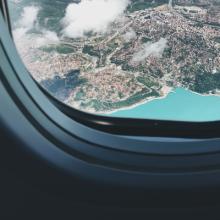
Cause:
Jet lag is a disturbance in a person's internal body "clock." It is most often experienced when traveling across several time zones.
Environmental factors associated with air travel may also contribute to jet lag. These factors include:
- Low oxygen levels
- Warm cabin temperature
- Decreased cabin pressure
- Low humidity
- Long periods of limited physical activity
- Smoky or smoggy atmospheres
Symptoms usually lasts 24-48 hours after traveling and include:
- Fatigue
- Daytime drowsiness
- Nighttime restlessness
- Headaches
- Altered mood
- Gastrointestinal discomfort, diarrhea or constipation
- Dulling of mental ability and memory
Medication adjustments for travel:
You may have to adjust medication schedules according to elapsed time instead of set local times. Prior to departure you should consult your physician for proper medication adjustment.
If you are diabetic and use long-acting insulin, you may have to change to regular insulin until you have adjusted to the time, food and activity of your new location.
Prevention:
Before departure, try to shift your body clock. If traveling west, go to bed later than usual for a couple of days before departure. If traveling east, go to bed earlier than usual for a couple of days before departure. Shift your meal times to coincide with those of your new location.
For long trips, schedule stopovers instead of straight-through flights.
Drink lots of fluids during and after your flight to prevent dehydration. Avoid beverages containing caffeine or alcohol.
Try to eat a high-protein meal in the morning to increase alertness, and eat a high-carbohydrate meal at night to induce drowsiness (see Argonne Diet for details).
Exercise in your seat and stand or move around in the cabin whenever possible. Physical activity helps to move nutrients and waste through the body and aids in excretion.
Stick to a regular sleep schedule. Do not nap when you get to your destination, because napping will keep you anchored in your old time zone.
Spend as much time as possible outside. Your internal clock is regulated by the amount of light (sunlight) that your body is exposed to throughout the day.
Some people use melatonin to relieve insomnia and jet lag symptoms. Melatonin is a hormone produced in the human body that helps regulate the sleep-wake cycle. Synthetic and animal-derived melatonin products are widely available in the US, but the government does not regulate them, so purity and potency cannot be guaranteed.
Sleeping pills may be prescribed for use during long flights. Consult a clinician if you are interested in or have concerns about sleep aids, or if you have prolonged sleep difficulties or other discomforts.
